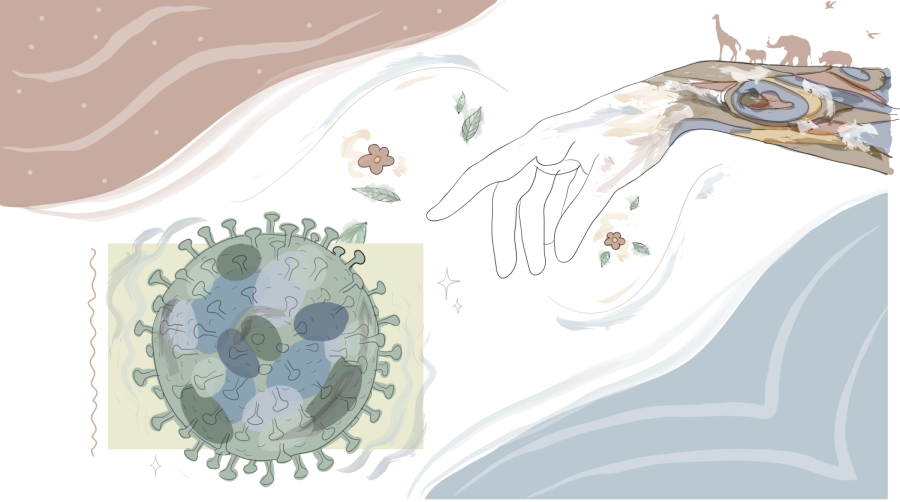Buening: COVID-19 Has Environmental Takeaways
(Graphic by Storey McDonald | The Daily Utah Chronicle)
October 1, 2021
COVID-19, while catastrophic and disruptive in many ways, forced the world to drastically change its patterns. COVID-era protocols gave us a glimpse into our relationship with and dependence upon the environment. More importantly, it showed us that there is a lot we can do as humans to modify our behavior to create a better future.
The lessons we’ve learned from the pandemic should drive us to restructure our relationship with the environment. Rather than revert to pre-COVID manufacturing techniques like we are beginning to do, we should use this opportunity to practice more reverence toward the environment, institute cleaner energy productions and examine our waste management.
Environmental Origins
From its beginning, COVID-19 has been an environmental issue with ecological repercussions.
To learn more about its environmental nature, I spoke with Professor Jennifer Shah from the University of Utah’s Environmental and Sustainability Studies Department. From this conversation, I learned more about our environmental role in creating and spreading the pandemic.
As we have created more extreme environmental conditions like rising thermal stress and extreme weather events, we’ve made the burden of disease greater.
Professor Shah pointed out another point of influence where we may have contributed to pandemic severity. She described how severe habitat loss, especially in “areas where many viruses emerge,” leads to “bad diversity loss” and a “loss of hosts” for viruses. When this happens, “various viruses then need to jump species to find new hosts.”
We know that COVID-19 is a zoonotic disease, as it transfers from a non-human animal to humans. This tells us that COVID-19 originated from some aspect of our interaction with the environment. And if we continue to destroy biodiversity, we may see zoonotic diseases become more common.
Some have completely overlooked the lesson we should take from this information, and instead made racist accusations and placed blame upon Chinese people.
COVID-19’s outbreak should have taught us something about our relationship with the environment. Overlooking nature’s purpose by treating animals and the earth like commodities makes us vulnerable to crisis.
A World Health Organization investigation provided further proof of this, citing human exploitation of wildlife as the likely cause of COVID-19.
Halt of Industrial Activity
During the more harrowing periods of the pandemic, however, there were some short-term environmental improvements.
During mass-confinement, global CO2 emissions decreased by 17% from 2019 levels. At the peak, individual countries decreased CO2 emissions by 26% on average.
With decreased demand and halts in industrial production, we saw significant improvements in air, water and noise pollution levels. In India, decreases in air pollution during lockdown made it possible to see the Himalayas for the first time in decades.
Confinement also drastically reduced human movement. In areas where tourism had previously hindered the ability of animals to reside in natural habitats, some species began returning. For instance, giant turtles began returning to deserted beaches in Florida and Thailand.
Cutting down aviation travel also had positive environmental impacts, given that aviation is one of the fastest-growing sources of greenhouse gas emissions.
After only a few months of shutdowns, the environment thrived with reduced human impact. This illuminates the importance of changing our behavioral habits.
Professor Shah emphasized that necessity, saying, “The cumulative impact of small decisions had such an effect on improving air.” Whereas our previous vehicle congestion and business practices created higher levels of pollution, a brief lockdown created a temporary “normal” that proved better for the environment. Regardless of the circumstances that led to shutdowns, COVID-19 proved that in one way or another, it is possible to reduce CO2 emissions and restore declining biodiversity. During times of “normalcy” in a non-pandemic world, this can seem like an infeasible goal.
Poor Haphazard Disposal
Despite our major declines in inactivity, we managed to maintain our negative impact in the form of waste.
Rapid increases in plastic waste due to personal protection equipment like masks wound up in the ocean, making sea creatures more vulnerable.
The more than 1.5 billion masks in the oceans can take up to 450 years to decompose. Scientists have found that the masks increase levels of microplastics in ocean environments and make animals susceptible to entanglement.
Global waste trade and plastic production, accompanied by improper disposal, has become a staple of our capitalist society. This disaster was aggravated by COVID-19.
To slow pandemic spread, we extraordinarily increased our production of disposable masks. 75% of these masks either end up in landfills or floating in the sea.
Before disaster ever struck, we should have largely replaced single-use plastic production with bio-based, biodegradable plastics. Now, to avoid the same events from happening in the future, we need to implement a shift to sustainable materials.
Shifting the way our society functions is challenging, especially on the global scale we need. However, Professor Shah detailed a few ways in which we can work toward realizing this ambitious goal.
One is to “change our own conception of what well-being is. Growth in the economy is so inextricably linked to and depends on people buying stuff.” We can no longer rely on this system to produce environmentally sound results. While change is hard to achieve on national and global levels, we can pursue aggressive reform in local arenas where our voices are more powerful.
Now that COVID-19 has emphasized so many areas for improvement, people need to take initiative and implement new ideas, whether that be through “entrepreneurial spirit” and “green business creation,” like Professor Shah mentioned, or something else.
COVID-19 allowed us to reevaluate our environmental practices. Our divorce from ecological values has led to the creation of the unsustainable systems in place today. However, this unprecedented time of shutdowns and decreased human activity showed us that our propensity for change is much greater than we realize. Instead of shying away from difficult transitions, let’s begin creating a new normal: ideally, one rooted in sound, sustainable principles.









